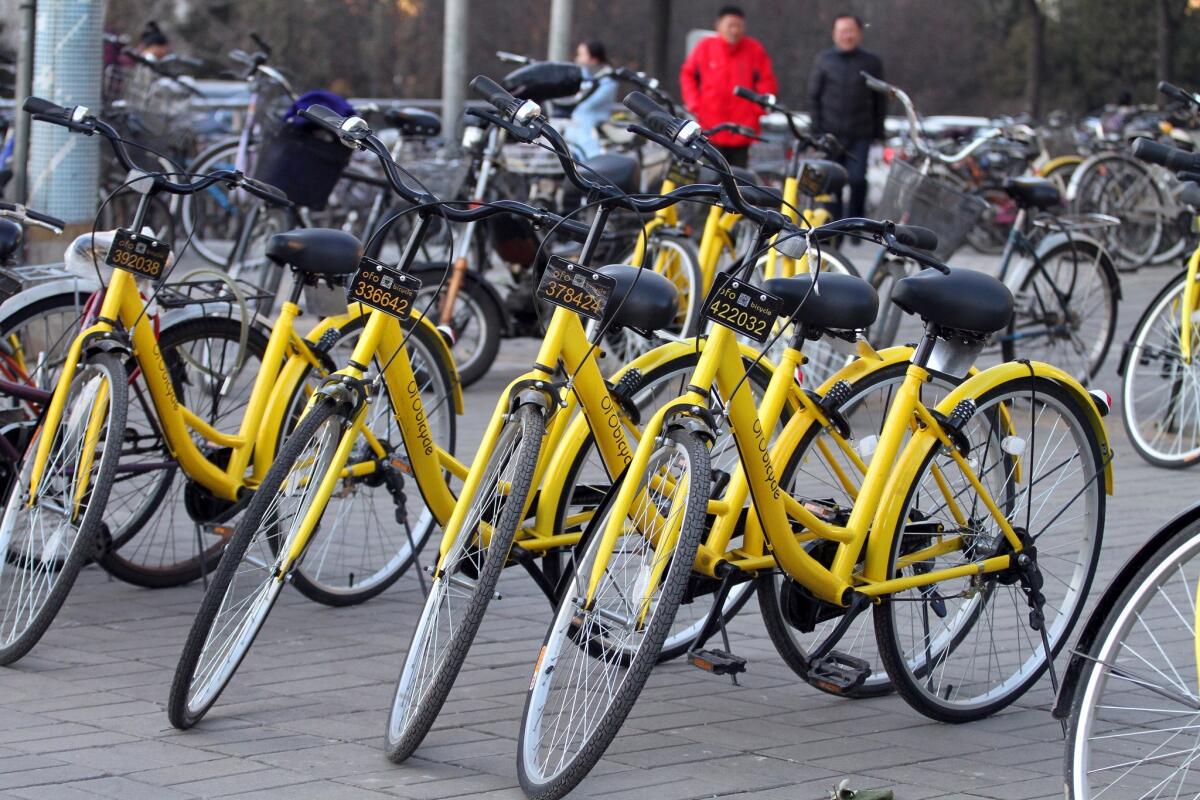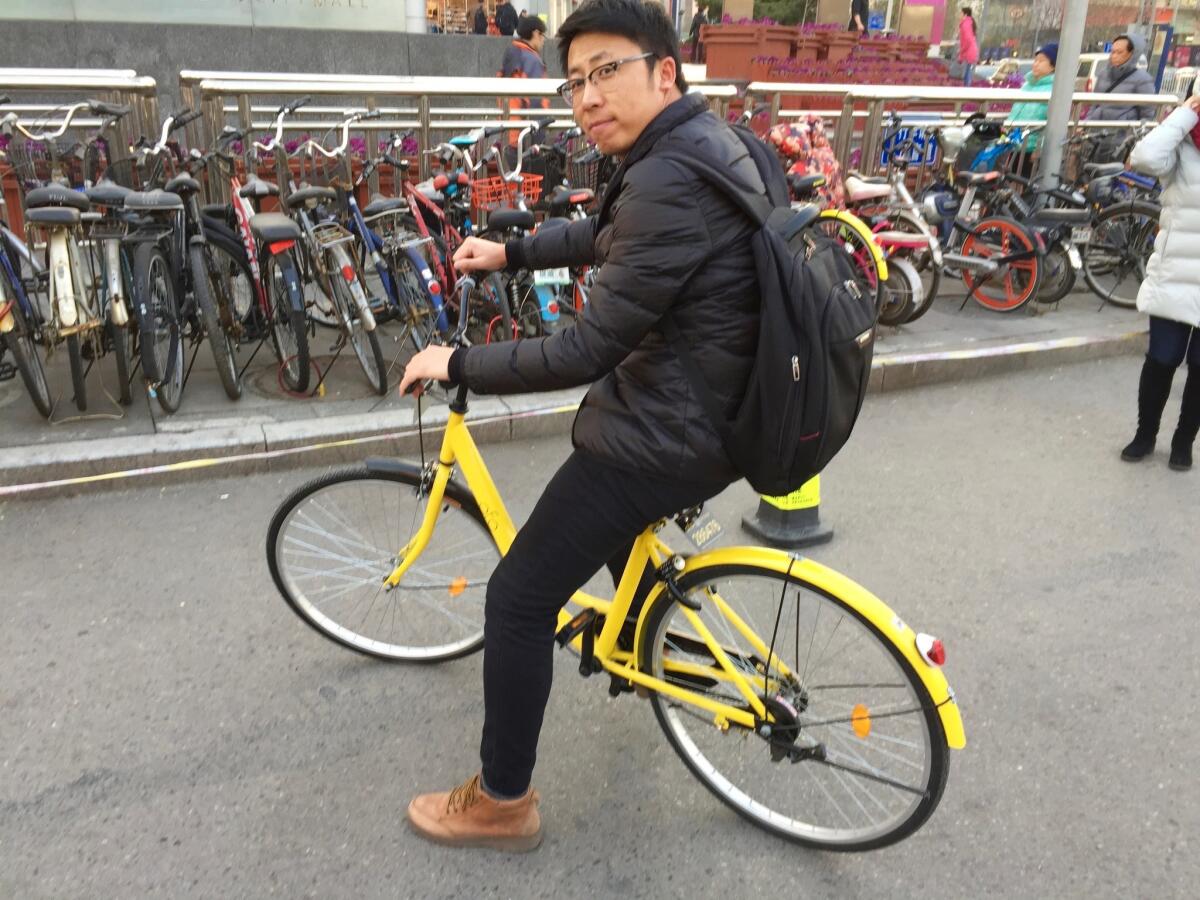Beijing lost its crown as the bicycle king, but two well-funded start-ups are trying to bring it back

- Share via
Reporting from Beijing — They’re suddenly outside public toilets, tucked in side alleys, on bridges, near underpasses.
The neon colored two-wheelers sit untethered — a reminder of the days when bicycles owned China’s streets, before their rusted remains become stand-in cones for drivers trying to keep a parking space.
These bikes are an attempt by two Chinese startups to fuel a cycling renaissance, one fit for a younger generation with Silicon Valley sensibilities. Mobike and Ofo Bicycle allow riders to unlock bicycles with a smartphone and drop them at their destination. While bike-sharing options exist around the world, few have made riding one this simple.
The rival companies, in just months, have turned Beijing streets into a blur of orange and yellow. They upend the copycat label bestowed on the country’s products and reveal how China, stunted by information barriers and bureaucracy, is also becoming one of the world’s most creative labs for innovation.
“We were looking at how cities have become filled with more traffic jams and pollution, and wondered what could we do and what should we do,” said Mobike co-founder Hu Weiwei.
Chinese officials are embracing companies like these as they try to revive a slowing economy by promoting innovation. Their goals are hampered by heavy censorship, an education system that stresses memorization over analysis, and insufficient intellectual property laws. The country still lags behind in science-related fields like pharmaceuticals.
Before Mobike, I thought only poor people rode bikes and the richer ones bought cars. Now I think riding is cooler than driving.
— An Haifeng, a 27-year-old film school graduate
But in the space where consumers and smartphones meet — from online payments to e-commerce — China is starting to dominate.
Both businesses launched last year, broadened to several Chinese cities, watched their staffs grow to nearly 300 people each and started planning international expansions. Mobike, short for mobile bike, aims to bring them to Singapore next year. Ofo — so-called because the letters look like a bicycle — expects to do the same, along with San Francisco and London.
China’s tech giants have chosen sides. Didi Chuxing — the ride-hailing behemoth that recently chased Uber out of China — is backing Ofo. Mobike gets support from Tencent, the country’s biggest Internet company, and is run by a former Uber Shanghai executive. Ofo has raised about $200 million. Mobike, according to China Business News, has pulled in more than $150 million.
So far, neither makes a profit.
Ofo’s headquarters, surrounded by skyscrapers in Beijing’s tech district, looks like a Palo Alto transplant. Bike tires dangle from the lobby’s ceiling, and engineers nap on couches. There’s a slide next to the steps. Everyone looks under 30.
The company’s five founders hatched their plan as students at Peking University, and started the service on college campuses. When riders come across the sunshine-yellow bikes, they unlock them with a code texted to their phone. A trip costs about 7 cents an hour, and requires a $13 deposit.
About 20,000 of its 190,000 bikes are ones owners offer to share.
“We want to be a whole new kind of bike-sharing platform,” said Li Zekun, Ofo’s 25-year-old public relations director. “We want bikes to be more than necessity, a lifestyle.”
A four-mile bike ride away, in an aging complex turned tech incubator, Mobike’s staffers plot their own development.
While Ofo’s bikes open via a small combination lock, Mobike uses a GPS system to track and secure its vehicles. A little locking mechanism attaches to the bike, which features airless tires and bright orange wheels. Riders pay a $50 deposit and twice as much per hour as Ofo. But they can find a bike in minutes through an app on their phone, scan a QR code on the bike to unlock it, and then scan it again to end the trip. About 100,000 bikes are scattered around five cities.
“We are using technology to create an experience that is easy, convenient, and for the good of all,” said Hu, a 34-year-old former journalist, slouched on an old couch in the office loft.
She’s fighting a downward trend. China counted 670 million bikes two decades ago, according to the Ministry of Transportation. By 2013, that number had dropped by nearly half.
During Mao Tse-tung’s rule, which ended with his death in 1976, bicycles suggested aspiration. People desired “three rounds and a sound:” a wristwatch, sewing machine, bicycle and radio. Bikes filled city streets and gave China the title “bicycle kingdom.”
But as the communist country’s economy ballooned and Chinese acquired new status symbols, people turned away from a cultural icon.
“You didn’t want to be associated with a lower level of evolution because you didn’t have a car,” said Lars Ulrik Thom, cofounder of Beijing Postcards, a company that focuses on modern Chinese history.
Mobike and Ofo bet society’s values are changing once again. They see these bikes as a sustainable alternative to congested cities doused with smog, either as a replacement for short commutes or in conjunction with public transport.

Both claim to have invented a new model, although they borrow liberally from traditional bike-sharing programs. About 600 are located worldwide, many run by local governments such as Velib in Paris and Metro Bike Share in Los Angeles. Hangzhou, a lakeside city in eastern China, boasts the world’s largest public fleet with 84,000 bicycles. While some city programs offer apps to find available bikes, they require riders to stash them at docking stations.
Social Bicycles, which operates a small fleet in Buffalo, N.Y., Hoboken, N.J., and a few other U.S. cities, allows riders to reserve bikes on their smartphones. But they must return them to specific locations.
Mobike and Ofo resemble car-sharing apps like car2go, a subsidiary of German automaker Daimler. A driver uses an app to find the car and deposits it in any legal parking space within the city. The service operates in nine countries, including the United States and in China’s southern megacity of Chongqing.
Like car2go, these bikes are trendy, accessible and simple to use, a perfect trifecta for Beijingers such as An Haifeng.
“Before Mobike, I thought only poor people rode bikes and the richer ones bought cars,” said the 27-year-old Beijing Film Academy graduate student. “Now I think riding is cooler than driving.”
Cellphones make it possible. Many Chinese never owned a personal computer and moved straight to smartphones as the country’s middle class grew. China now has 1.3 billion mobile phone users, according to a government report released last month. Many not only use them to chat and text, but to order dinner, hail a cab and pay their electricity bills.
“The Chinese mobile ecosystem may be the most innovative on the planet,” said Jeffrey Towson, a professor of investment at Peking University. “Not only are these mobile apps awesome, but they are outrunning the West.”
Yet Chinese consumers are fickle, he said, and trendy brands can fade fast. The companies struggle with bikes that disappear into locked courtyards or land on grumbling citizens’ front steps. International expansion efforts could face an array of regulatory hurdles.
But the bicycle, at least for now, is again big in Beijing.
These companies “are in great shape,” Towson said. “Those bikes are freakin’ everywhere.”
Meyers is a special correspondent. Yingzhi Yang in the Times’ Beijing bureau contributed to this report.
Twitter: @jessicameyers
ALSO
In China, American Apparel courts controversy — but not over what you’d expect
China condemns Trump over ‘one China’ policy; state news agency calls him ‘as ignorant as a child’
After the impeachment, uncertainty reigns in South Korea
More to Read
Sign up for Essential California
The most important California stories and recommendations in your inbox every morning.
You may occasionally receive promotional content from the Los Angeles Times.












